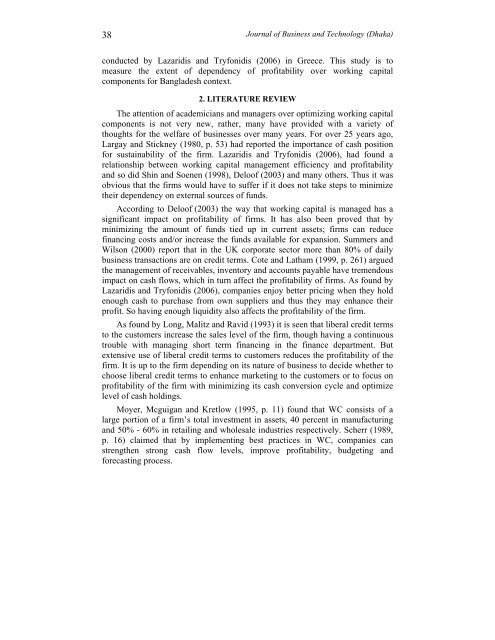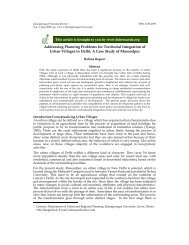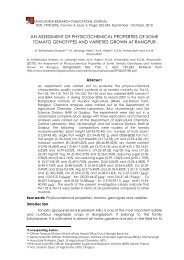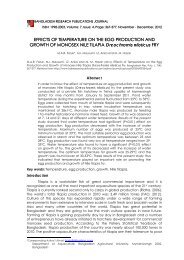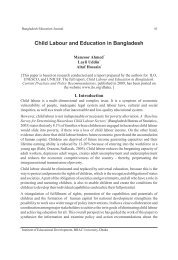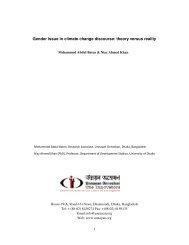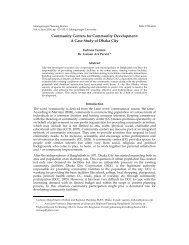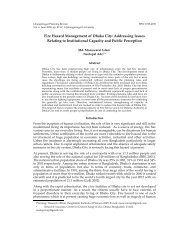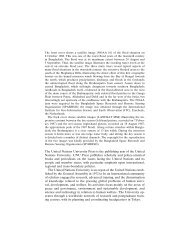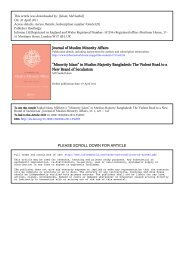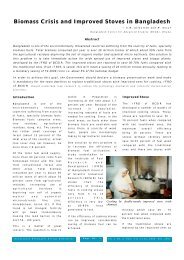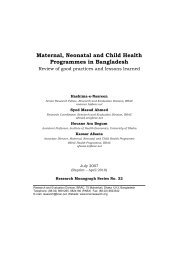Effects of Working Capital Management and Liquidity - Bangladesh ...
Effects of Working Capital Management and Liquidity - Bangladesh ...
Effects of Working Capital Management and Liquidity - Bangladesh ...
You also want an ePaper? Increase the reach of your titles
YUMPU automatically turns print PDFs into web optimized ePapers that Google loves.
38Journal <strong>of</strong> Business <strong>and</strong> Technology (Dhaka)conducted by Lazaridis <strong>and</strong> Tryfonidis (2006) in Greece. This study is tomeasure the extent <strong>of</strong> dependency <strong>of</strong> pr<strong>of</strong>itability over working capitalcomponents for <strong>Bangladesh</strong> context.2. LITERATURE REVIEWThe attention <strong>of</strong> academicians <strong>and</strong> managers over optimizing working capitalcomponents is not very new, rather, many have provided with a variety <strong>of</strong>thoughts for the welfare <strong>of</strong> businesses over many years. For over 25 years ago,Largay <strong>and</strong> Stickney (1980, p. 53) had reported the importance <strong>of</strong> cash positionfor sustainability <strong>of</strong> the firm. Lazaridis <strong>and</strong> Tryfonidis (2006), had found arelationship between working capital management efficiency <strong>and</strong> pr<strong>of</strong>itability<strong>and</strong> so did Shin <strong>and</strong> Soenen (1998), Delo<strong>of</strong> (2003) <strong>and</strong> many others. Thus it wasobvious that the firms would have to suffer if it does not take steps to minimizetheir dependency on external sources <strong>of</strong> funds.According to Delo<strong>of</strong> (2003) the way that working capital is managed has asignificant impact on pr<strong>of</strong>itability <strong>of</strong> firms. It has also been proved that byminimizing the amount <strong>of</strong> funds tied up in current assets; firms can reducefinancing costs <strong>and</strong>/or increase the funds available for expansion. Summers <strong>and</strong>Wilson (2000) report that in the UK corporate sector more than 80% <strong>of</strong> dailybusiness transactions are on credit terms. Cote <strong>and</strong> Latham (1999, p. 261) arguedthe management <strong>of</strong> receivables, inventory <strong>and</strong> accounts payable have tremendousimpact on cash flows, which in turn affect the pr<strong>of</strong>itability <strong>of</strong> firms. As found byLazaridis <strong>and</strong> Tryfonidis (2006), companies enjoy better pricing when they holdenough cash to purchase from own suppliers <strong>and</strong> thus they may enhance theirpr<strong>of</strong>it. So having enough liquidity also affects the pr<strong>of</strong>itability <strong>of</strong> the firm.As found by Long, Malitz <strong>and</strong> Ravid (1993) it is seen that liberal credit termsto the customers increase the sales level <strong>of</strong> the firm, though having a continuoustrouble with managing short term financing in the finance department. Butextensive use <strong>of</strong> liberal credit terms to customers reduces the pr<strong>of</strong>itability <strong>of</strong> thefirm. It is up to the firm depending on its nature <strong>of</strong> business to decide whether tochoose liberal credit terms to enhance marketing to the customers or to focus onpr<strong>of</strong>itability <strong>of</strong> the firm with minimizing its cash conversion cycle <strong>and</strong> optimizelevel <strong>of</strong> cash holdings.Moyer, Mcguigan <strong>and</strong> Kretlow (1995, p. 11) found that WC consists <strong>of</strong> alarge portion <strong>of</strong> a firm’s total investment in assets, 40 percent in manufacturing<strong>and</strong> 50% - 60% in retailing <strong>and</strong> wholesale industries respectively. Scherr (1989,p. 16) claimed that by implementing best practices in WC, companies canstrengthen strong cash flow levels, improve pr<strong>of</strong>itability, budgeting <strong>and</strong>forecasting process.


